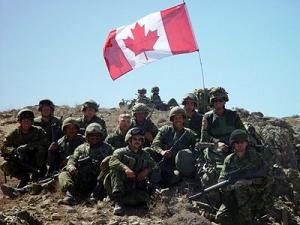Peacekeeping or War-making?

Watching the response of the Canadian government to the catastrophe in Haiti I am sure I am not the only person to see this as a powerful counterpoint to our grotesque participation in the occupation of Afghanistan. How do Canadians feel, for example, when they hear of an RCMP officer killed as a peacekeeper versus a soldier killed in Afghanistan? Sadness for both, of course – both were doing jobs they were told to do. But the death of the soldier in Afghanistan is much more complicated. For me, the death is doubly tragic because that soldier is there illegally, the killing he is engaged in (both civilians and the Taliban) is done for no purpose the government can explain, and the mission itself is almost universally recognized as ill-conceived and doomed to fail – no matter how its goals are defined. Nothing good will come from all those lives lost, mangled or ruined by serious injury.
While the RCMP’s role in Haiti can never be seen to be completely pure and altruistic, given Canada’s shameful role in ousting Haiti’s president, by most accounts Haiti had become less violent. And the Haitian people generally welcomed the development, such as it was, and the peace. At least our mission there, tainted as it was, allows for honourable deaths of soldiers and police if and when such occur.
In Afghanistan, ultimately, no such honour is possible. We send our soldiers, most of them young, to a place that does not want them, where they know that progress is either temporary or non-existent, where they are propping up a terminally corrupt Afghan government and are complicit in the geo-political objectives of the US in securing oil and gas supplies. A death here is tragic because it is we, as Canadians, who are sending soldiers to die for nothing. Worse, to die for an ignoble cause.
They could be doing peacekeeping. Contrary to the conventional wisdom, there are more active peacekeepers now than at any time in the UN’s history – personnel in the field has grown more than five fold since 1999 with 97,569 military and police now serving in 15 UN-led peacekeeping missions. Canada, however, has fallen from being the single largest contributor of UN peacekeepers in 1992, to 56th place today. Once the contributor of nearly 3,300 peacekeeping soldiers, Canada now contributes just 57.
The peace movement, or what is left of it these days, should be taking advantage of the dramatic contrast of “our” soldiers in Afghanistan, doing America’s dirty work, and the massive aid efforts being made in Afghanistan. Which makes Canadians feel proud of being Canadian?
Having said that, I must admit the jury is still out on the role that Canadian troops will end up playing in Haiti. Has Stephen Harper suddenly changed his mind about peacekeeping missions for which he has shown such disdain in the past? If he has it’s only for opportunistic reasons connected with his 10 point drop in the polls. The US has already been accused of militarizing the aid efforts and many see the US presence there as intended to ensure that progressive forces do not once again organize grass-roots anger and discontent and demand radical change. It is quite possible that the Harper government has joined forces with the US in this cynical effort to support the repressive status quo. We need to be vigilant in watching exactly what the military is doing, this time, in our name.

